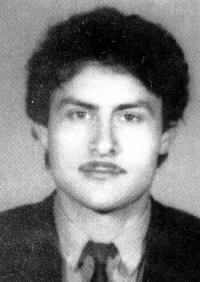The bread, the meat, the eggs and other products were rationalized becuase of Ceauşescu and his wife, who declared that the Romanians would pay the external debt of the country even if they ate bark.

Stáhnout obrázek
He was born on March 25, 1959, in Mălăieştii de Jos, a village in Dumbrăveni, Prahova County. In 1978, Nicolae Liţoiu started working at the Plopeni Mechanical Factory, graduating from the Industrial High School in Plopeni in 1981. Together with his brother-in-law, Nicolae Gheorghe (who had been arrested twice: in 1967 for setting up an anti-communist group made up of several young people, and in 1974 for „attempt of illegal border crossing“ after having talked to someone to leave the country by plain from the airport in Strejnic), in August 1981, Nicolae Liţoiu wrote several manifestos by hand that read slogans such as: „No bread without work, no work without bread! „, „Down with Communism!“, „Down with the shoemaker‘s family!“, calling Nicolae Ceauşescu „dictator“ and „tyrant“. The leaflets were distributed in the Plopeni Mechanical Factory and in Ploieşti. A few weeks later, Nicolae Gheorghe placed an explosive device in the Mercur bookstore in Ploieşti, in the shopfront where Nicolae Ceauşescu‘s books were on display. The anti-communist actions of the two men culminated in them placing another explosive device and several manifestos at the County Council in Ploieşti, on September 19, 1981. Arrested on September 19, 1981, Nicolae Liţoiu was questioned at the Securitate headquarters in Ploieşti and in Bucharest for about eight months. Following the trial from April 14, 1961, Nicolae Liţoiu was sentenced to 20 years in prison - the sentence was later reduced to 15 years. Although having acted together with his brother-in-law, Nicolae Gheorghe was not arrested by the communist authorities in September 1981 and thus managed to cross the border illegally into Yugoslavia and take refuge in the West. He was tried in absentia in April 1981 and was sentenced to death. After seven years and three months spent in prison, in Ploieşti, Rahova, Aiud and Jilava, Nicolae Liţoiu was released on January 3, 1989. Shortly after his release, Nicolae Liţoiu converted to the evangelical faith. He is now living in Ploieşti and is preaching the Gospel within the church since 2003, but also to detainees in different prisons (Ploieşti and Bacău).
